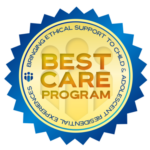Today, Wednesday, March 2, is World Teen Mental Wellness Day. This annual observation aims to bring more awareness to the unique mental health challenges teens experience and end the stigma associated with talking openly about issues like anxiety and depression. Here’s how you can do your part to help a teenager in your life.
1. Know the Red Flags of Teen Mental Illness
Being a teenager is complicated. Adolescents must deal with the rapid physical changes associated with puberty while they are under incredible stress to maintain good grades, have an active social life and participate in extracurricular activities. On top of all that, they are starting to make critical decisions about things like their future career choices, which could have consequences for the rest of their lives.
Worrying about these stressors is a typical part of adolescence, which is why it can be so challenging to notice warning signs of mental illness in tweens and teens. In general, what are some things you can look for?
- Changes in sleeping, eating or hygiene habits
- Loss of interest in school or hobbies
- Irritability and unpredictable mood swings
- Erratic or abnormally risky behavior, including substance use or self-harm
- Secrecy
- A desire to spend most of his time alone
2. Understand What Constitutes Teen Mental Illness
Mental health disorders often run in families, so it’s possible you have identified some of the red flags of mental illness in yourself or other relatives. Still, symptoms can vary in severity and manifest differently in one person to the next, so it helps to educate yourself about the specific issues your teen is experiencing.
Talk to your teenager and encourage him to be open and honest about his emotional ups and downs. An adolescent who feels genuinely loved and supported by the adults in his life may be more willing to let someone know when he starts getting overwhelmed, giving you a better chance of figuring out the appropriate solution.
3. Start Going to Therapy
Though teens can be surprisingly resilient, mental health issues may worsen without treatment. Teens who fail to get the support they need to lead happy, fulfilling lives could end up further trapped in a cycle of helplessness. They may also start self-medicating with drugs or alcohol, leading to a co-occurring substance use disorder.
A family therapist who specializes in working with adolescents can help you and your child address the root causes of his mental wellness challenges. They may give you specific exercises to work on honing a teen’s communications skills or identifying problems within their relationships. A trained counselor can also help you understand your teenager’s unique risk factors for developing various mental illnesses, and pinpoint changes you and other adults can make to improve teen mental health, including avoiding harmful habits like enabling.
Improving Teen Mental Health for More Than 30 Years
Ultimately, a teenager’s struggles with mental wellness can have a ripple effect on your whole family, especially if those challenges lead to a reliance on drugs and alcohol. At ARCH Academy, our mission is to help young men and their families heal and move forward together through a carefully designed program that combines a 12-step curriculum, family involvement, academics and adventure to inspire lifelong recovery. Contact us today to learn more about what we offer.




